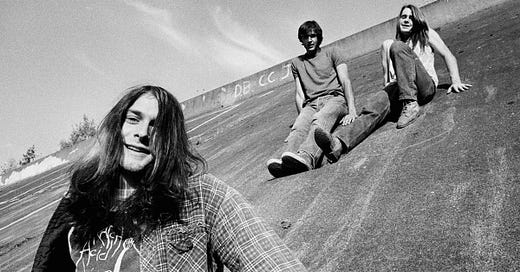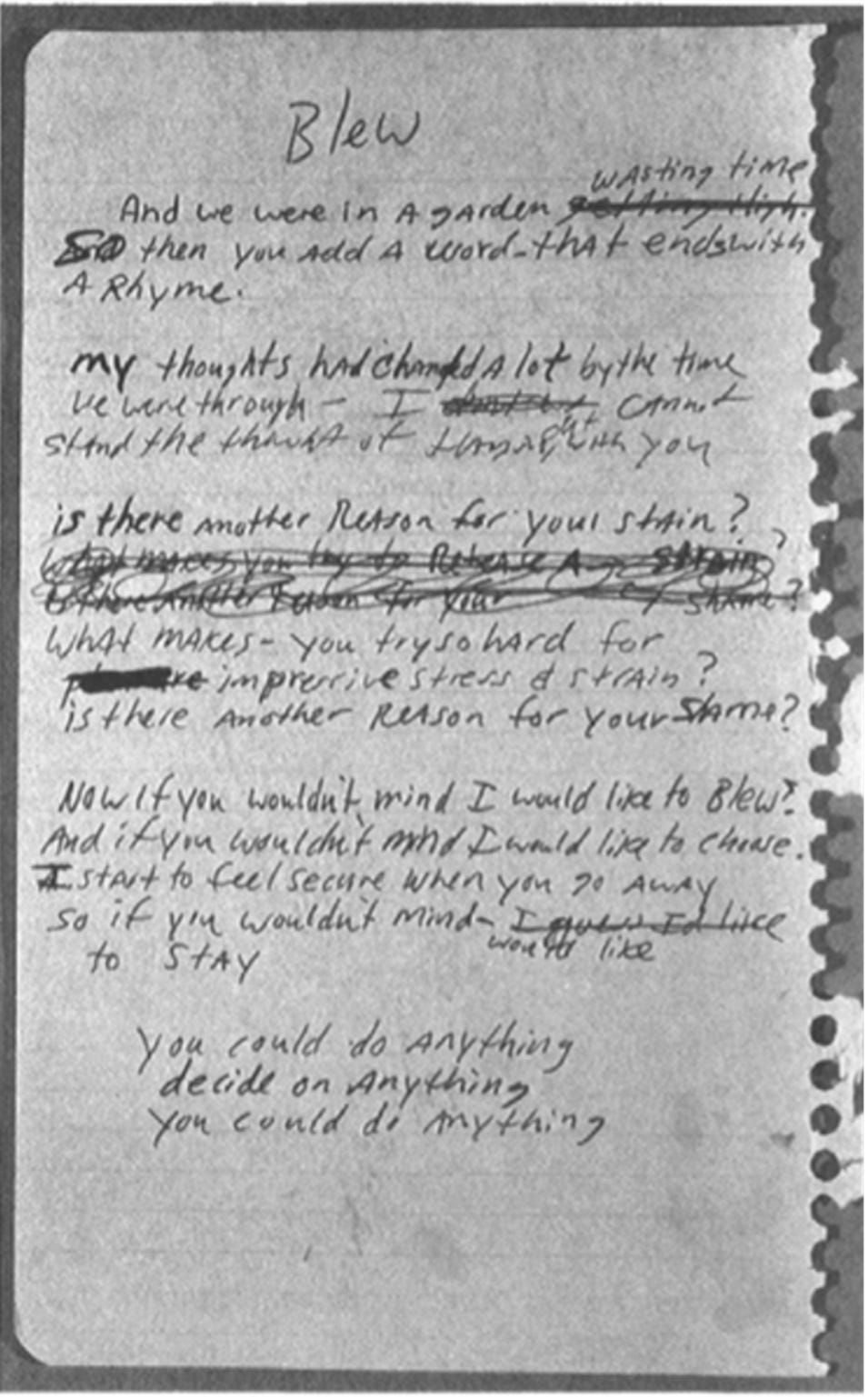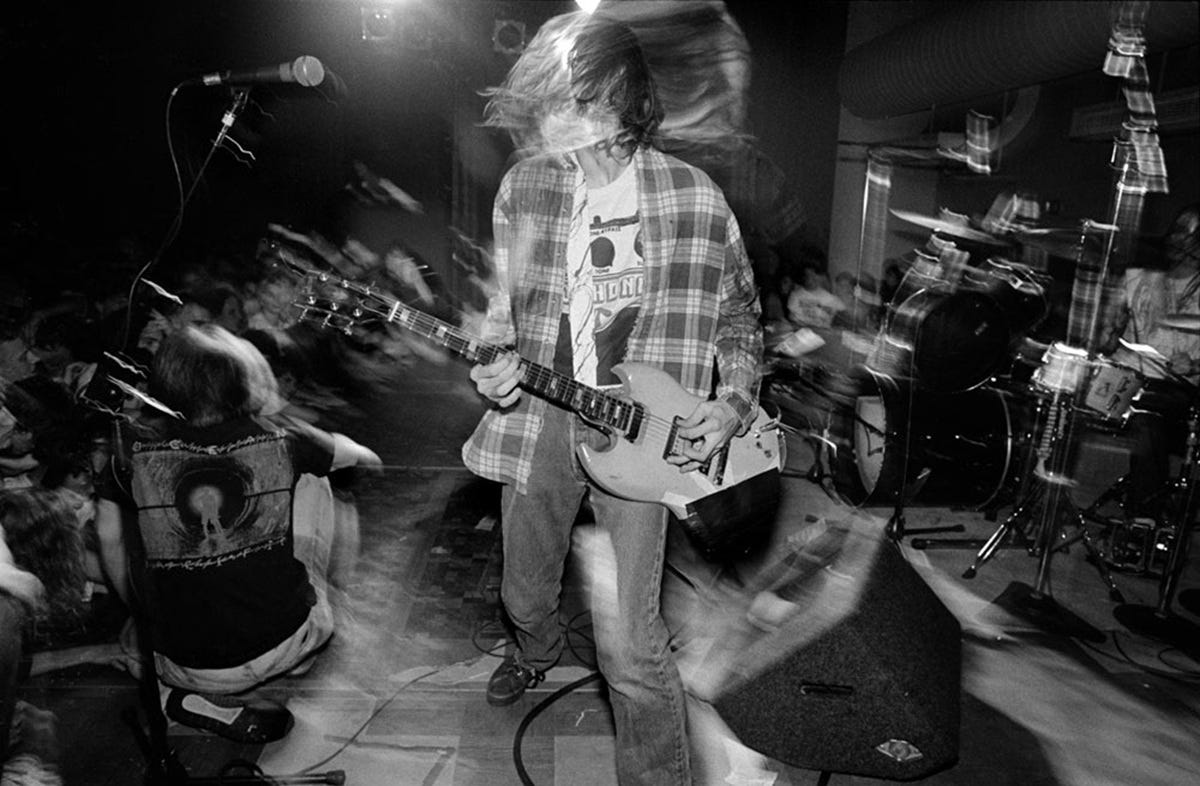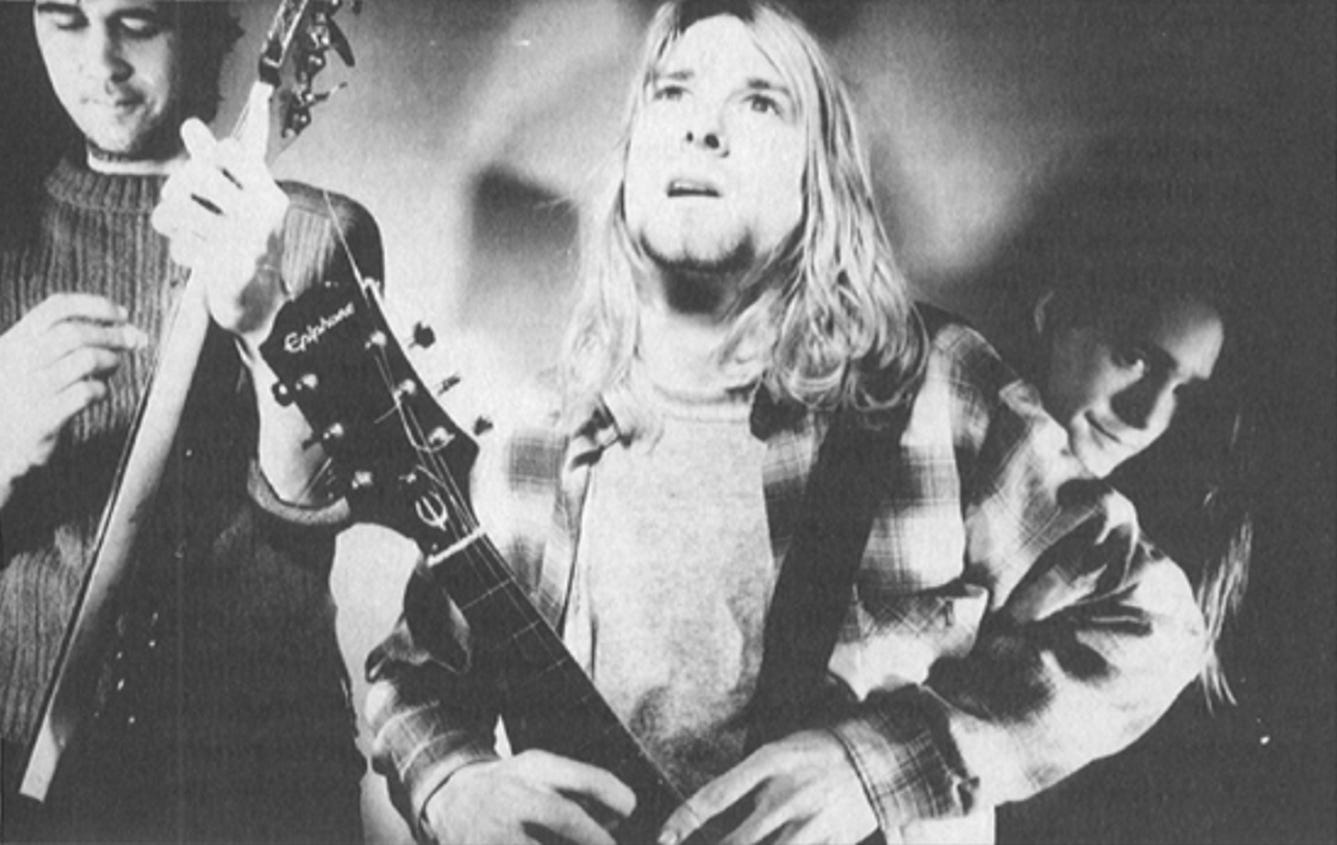GIRL MUSIC 004: BLEACH | NIRVANA
"Would you believe me when I tell you, you're the queen of my heart?"
GIRL MUSIC is an independent music newsletter for anyone that loves pretty art and music.
» Consider buying me breakfast or coffee on Ko-Fi/PayPal, or leaving me a small tip on Venmo.
« Contact me at juno.stump@gmail.com if you need someone with experience in mock reviews, copy editing/writing, PR work, etc »
Words: Juno Rylee Schultz (she/her)
Edits: Morgan Shaver (they/them), Nathan Miller (he/him), and Bex Stump (she/her)
Sources: Come As You Are: The Story of Nirvana by Michael Azerrad, Heavier Than Heaven: A Biography of Kurt Cobain by Charles R. Cross, and Journals by Kurt Cobain
"There was this pressure from Sub Pop and the scene to play 'rock music.’ Strip it down and make it sound like Aerosmith. We knew that that was the thing we had to do. We had been doing it and we started doing that stuff on our own and now that it's a popular thing, we might as well cash in on it and become popular that way, because eventually we'll be able to do anything. We wanted to try to please people at first, to see what would happen."
Kurt Cobain discussing the making of BLEACH
Kurt Cobain had grand visions of burying pop-music melodies inside incandescent, punk rock tracks, but the candied-apple, verse-chorus-verse moments were more tightly packed between the sludgy riffs that record label Sub Pop desired for their roster’s image at the time.
"We just found ourselves reestablishing our songwriting within a couple of months. It really was a great learning experience because that's really more where my roots are at anyhow--in rock, rather than the weird quirky new wave stuff that we were trying to do."
Kurt Cobain discussing how Sub Pop’s restrictions provided a path forward
Nirvana had been starting to experiment with their sound, incorporating more elements from New Wave music, and other genres of music that were more removed from the Sub Pop scene at the time.
Kurt had written a Vaselines-influenced song called ‘Beans’ (based on the Jack Kerouac book ‘The Dharma Bums’) that he wanted to include on the upcoming album, along with three other “weird and quirky” songs the band wanted to include, but Sub Pop co-founder Jonathan Poneman wouldn’t agree to it.
In a strange way, the limitations of what the indie label executives would allow helped Cobain establish his early sound; finding the balance between what he wanted to play, what audiences were expecting from rock bands on stage at the time, and what felt like was required by Sub Pop.
Three weeks before the recording of BLEACH, the band started an intense practice routine, often beginning at eight ‘o clock in the evening, as soon as Krist Novoselic’s Mom locked up her hair salon for the night.
It was then that Kurt Cobain and the rest of the band would begin working out songs, late into the early hours of the morning.
"I wanted a name that was kind of beautiful or nice and pretty instead of a mean, raunchy punk rock name. I wanted to have something different."
Kurt Cobain discussing how he came up with the band name for Nirvana
Nirvana’s first day recording BLEACH was on December 24, 1988—New Year’s Eve. Kurt, Krist, and Chad did five hours of basic tracking with Jack Endino before heading back into town for holiday time with their families and friends.
Four days later, Nirvana played a release party for ‘Sub Pop 200’ at the Seattle Underground.

The band cut five more tracks the following day, with work on BLEACH being fully completed on January 24, 1989, adding up to thirty six hours in total at Reciprocal Recording Studio, costing the band $606.17.
The band’s biography says the mixes of Bleach might sound a little odd because of how sick the band was at the time.
"We were all sick by then, and we had this codeine syrup from the Pierce County Health department. So we were drinking a lot of that for our sickness but we were really on codeine and we were mixing the record and getting really into it"
Krist Novosellic discussing the making of BLEACH
Most of the songs on BLEACH contain simpler lyrics, sometimes only possessing one verse that’s repeated two or three times, but it’s in the vocal phrasings and melodies where the album can’t hide its shine.
The album may sound less complex than future releases from Nirvana, but it’s all part of the deceptive packaging the band had to wrap it in for Sub Pop.
"I decided to write songs that I would easily remember the lyrics to so I wouldn't fuck them up during the live show. Not much thought went into them at all. It's pretty obvious. “
Kurt Cobain discussing the lyrics of Bleach
In reality, Kurt had an album filled with lyrics from his life, changed poetically into trans mutational lyrics that could be interpreted in dozens of different ways.
Just like William S. Burroughs, Lead Belly, and other legendary lyricists and poets had done, artists who had all left their mark and influenced the mind of Kurt Cobain.
‘Blew’ was always intended to be a muddy song, with a bouncy chorus that hooks through the center—like a fish twisting on a line and trying to escape the depths of hell—but the band accidentally tuned their guitars a full note below the intended “Drop D” tuning configuration; this added an extra thickness to the mix, making it one of the sludgiest songs Nirvana would ever put out.
With lyrics focused on wanting to break free, the “Drop C” tuning mistake became the bow on top of an already solid track.
‘About a Girl’ was introduced so bashfully by Kurt to the rest of the band that he literally sang the song for the first time at rehearsal with his back to everyone in the band.
When Chad remarked “that song’s pretty” and asked what it was called, Kurt simply replied, “Oh, it’s about a girl.”
The line "I can't see you every night—free" refers to the fact that Kurt’s girlfriend at the time—Tracy Marander—was threatening to kick him out of her house if he didn't get a job.
It’s such a great example of how simultaneously specific Kurt’s lyrics could be, while still feeling like something everyone could sing along to.
Kurt did something similar with ‘School,’ carving out his frustration with scene politics and record label limitations into a catchy pop riff that bastardizes the sound of the very scene he felt trapped in.
"We wrote it about Sub Pop … it's one of those late seventies ‘disco sucks’ songs that nevertheless used a disco beat. It was a joke at first, and then it turned out to be a really good song"
Kurt Cobain speaking about writing the song ‘School’
Kurt was happy with Chad Channing’s drumming on the majority of the tracks but decided to remix the previously recorded demo versions of ‘Floyd the Barber’ and ‘Paper Cuts’ for the album, recorded with the band’s previous drummer Dale Crover.
BLEACH wouldn’t be released for a few more months though. It was the early days of Sub Pop and the record label’s executives had to wait until they could borrow the money to put out the release.
After finishing all the work on the album, Nirvana went on a two week tour of the West Coast. It was on this tour, while in San Francisco, that Nirvana witnessed an “anti-AIDS campaign” being promoted all over the city, with signs everywhere saying to "bleach your works.”
There was even a person dressed up as a giant bleach bottle that was walking around town and handing out free bottles of bleach, in an effort to stop the spread of the AIDS virus between drug users.
The band and Sub Pop executives were discussing how bleach could become one of the most powerful things on the planet one day. That was when Nirvana’s then untitled album received its name.
Sub Pop didn’t do much in the way of promotion for BLEACH, even ending promotion and advertisement of the album after two months, but Nirvana’s first album was still selling steadily—especially considering how unstable distribution was for the label at the time.
“It's the typical story of showing up at gigs and ten to twenty kids coming up to the stage and saying ‘We can't find your record anywhere!’ It got real tiring. We didn't do any interviews. We felt we deserved a little bit more than what we were getting. I would have been comfortable playing to a thousand people. That was basically our goal--to get up that size of a club, to be one of the most popular alternative rock bands, like Sonic Youth."
Kurt Cobain speaking about the early days of Nirvana and Sub Pop
BLEACH was released in June 1989. Nirvana went on their first US tour to promote the album—”a total hungry punk rock tour” as Krist Novosellic described it—consisting of twenty six different shows across the country that the band would travel to in an old, white, Dodge van.
The band was responsible for their own tour and lodgings, often choosing to sleep in parking garages, national parks, camp sites, and anywhere they could find.
There was one night where the pacific northwest punk rockers even camped out in a Texas swamp, with a sign that read “Caution Alligators.”
Kurt and Krist dug a baseball bat and two-by-fours out of the van—in case of an alligator ambush—but in the end, the band got hungry and used the wood for a fire to cook the cans of soup they brought with them.
The band’s first US tour was a rush of energy. They were playing bars and smaller clubs, but it was also their first album—an album that had just released—and it was all in places they had never been to before.
"Every time we played a show, it seemed like we got just enough money to put gas in the tank and food in our stomach to make it to the next friggin' gig.”
Chad Channing talking about Nirvana’s first US tour
Everyone was having a good time, especially when more people started showing up at shows. College radio stations were starting to play ‘About a Girl’ and other tracks from BLEACH.
The tour was already going well but the band was starting to feel indie famous, which made the energy even better. They were starting to feel like a real rock band.
Kurt started doing silly stuff on the road too, like in Chicago when he bought a large cross at a garage sale. He would whip the crucifix out at cars while on the road and take pictures of their reactions because, well, that was Kurt. He just thought it was funny.
"We were totally poor but God, we were seeing the United States for the first time. And we were in a band, and we were making enough money to survive. It was awesome. It was just great.”
Kurt Cobain discussing Nirvana’s first US tour
In an article in the University of Washington newspaper, Kurt said the band's music had a "gloomy, vengeful element based on hatred."
The piece added that Kurt's outlook had improved of late, leading to what Kurt called " a gay pop song phase that will eventually die."
Kurt Cobain would have more control over the album artwork, liner notes, and other aspects of the packaging, for future albums and releases, but this wasn’t the case during the band’s indie label days.
Sub Pop’s executives intentionally selected photographs of the band that made them “look like mutants,” as Kurt Cobain explained it, while talking about the making of BLEACH for Nirvana’s biography with Michael Azerrad.
The goal with Sub Pop at the time was to create uniformity and a synergy amongst their roster of artists, and they were framing a lot of the bands like they were freakishly unreal lumberjacks, that just happened to be holding guitars instead of chainsaws.
The BLEACH era of Nirvana did however give birth to the NIRVANA logo—which is in a Bodoni Extra Bold Condensed type font. There are spacing inconsistencies between the letters, because the typesetter was rushed. The spacing incongruity adds style, almost making the letters look otherworldly.
It was Kurt’s choice to change his name for the credits, a trend he would flirt with in the future as well.
"I think I wanted to be anonymous at first. I was really thinking about changing my name for the Nevermind record. But then I just decided to spell it the right way. I just wanted it to be confusing. I wish I would have done the same thing that Black Francis [of the Pixies] did. He's changed his name so many times that nobody really knows who he is. I wish nobody ever knew what my real name was. So I could some day be a normal citizen again. I have no real reason. I just didn't bother with spelling it correctly. I didn't care. I wanted people to spell it differently all the time.”
Kurt Cobain discussing the packaging and liner notes for Bleach
BLEACH didn’t have a massive impact initially, inside or outside the Sub Pop scene, but once it started selling, it started selling.
“We put out BLEACH and gosh, it just kept selling. Never ever in the history of our company have I seen a record just sell and sell and sell. Nirvana did tour, but a lot of bands tour. The word of mouth was there. There was something special there."
Bruce Pavitt, founder of Sub Pop, talking about BLEACH’S release
BLEACH is a sonic mixture of freeze-dried melodies and primal screams that still manages to captivate audiences, decades after its release. The amalgamation of angst and flower-petal pop couldn’t possibly be pushed through a strainer by any other band.
My four favorite tracks from Bleach are:
notable interviews from the BLEACH period:
Nirvana talks with the University of Washington in Seattle (January 1990)
3. Bleach drummer Chad Channing discusses Bleach and Nirvana’s legacy (March 2018)
notable performances of music from BLEACH:
Nirvana - About a Girl (MTV Unplugged, December 1993)
Nirvana - Blew (Rhino Records, June 1989)
Nirvana’s first recorded concert (January 1988)
The last time Blew was ever performed (Nirvana’s last concert, March 1994)










